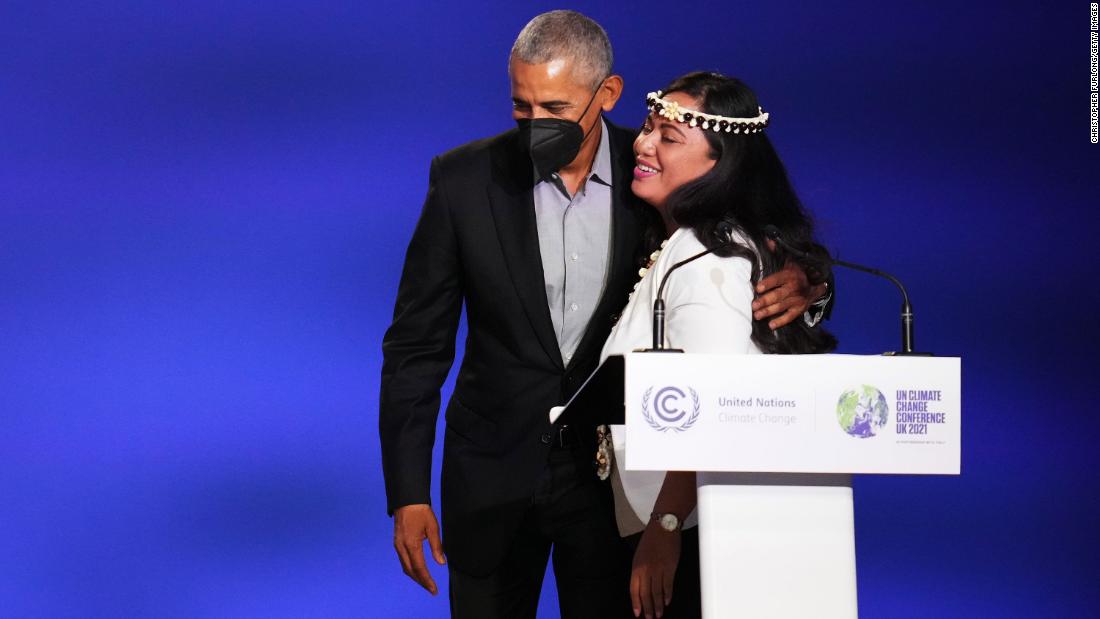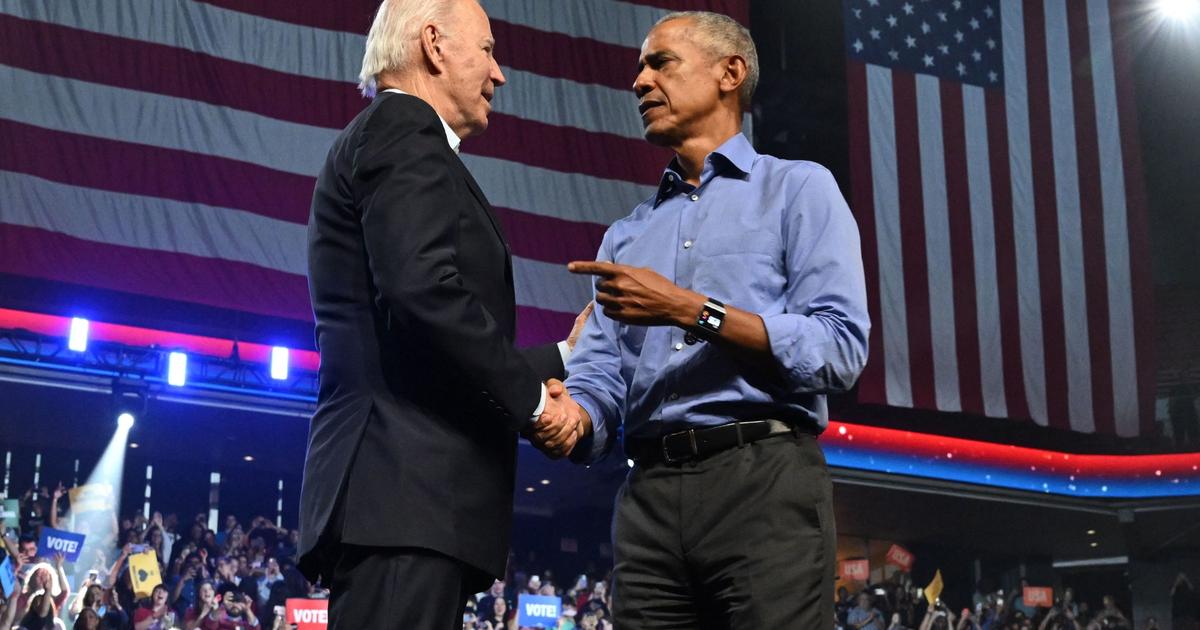Abdalah Mokssit: There are climatic events that have no turning back 8:53
Glasgow, Scotland (CNN) -
The second week of the COP26 climate summit in Glasgow, Scotland has started, and things are starting to heat up.
This is what you need to know.
What a 'Glasgow Agreement' would look like
The UK COP26 presidency published something that is called, oddly, an "unofficial document", which is basically a list of things that could end up in the final Glasgow deal.
So what's in it?
There are references to strengthening language around limiting global warming to 1.5 degrees above pre-industrial levels, which was COP26 President Alok Sharma's big goal for the summit. The 2015 Paris Agreement forced countries to try to limit warming to 2 degrees, and preferably closer to 1.5 degrees. But the latest science shows that the world really needs to limit warming to 1.5 degrees to avoid catastrophic climate change.
Reference is made to the need to "accelerate" cuts in greenhouse gas emissions rapidly during this decade.
This is in response to concerns that many countries have made net-zero commitments by mid-century but do not have a plan for how to get there or plans that are too weak to actually meet the targets.
There is a recognition that more money must be transferred from the developed world to the Global South to help those countries adapt to the climate crisis.
This is becoming one of the biggest sticking points of the conference.
The document has a series of "placeholder" bullets, showing that various applications are proving controversial.
Greenpeace called the list "exceptionally weak" and criticized it for not mentioning fossil fuels, the main driver of climate change.
The United States and China are the world's largest greenhouse gas emitters.
But who is worse?
The main producers of fossil fuels resist 1.5 degrees
Some of Saudi Aramco's crude is processed at its facilities in Abqaiq, Saudi Arabia, in 2019.
Environmental groups say Saudi Arabia, China and Russia are resisting the effort to adopt a stronger goal.
advertising
Various parties to the Paris Agreement, including the US, UK and the EU, want the target to change to 1.5 degrees.
But Jennifer Tollman, a senior policy adviser at the E3G climate think tank, said some of the major fossil fuel producers are skeptical about formalizing that goal.
"We will have to see who makes their positions public, but those who have definitely shown skepticism include Saudi Arabia," Tollman told CNN, adding that China and Russia were also showing some resistance.
On Monday, E3G sent a briefing note to the media saying that Saudi Arabia was "hinting at the use of delaying tactics on the adaptation elements to avoid ambitious decisions" on lowering the temperature target.
Greenpeace International CEO Jennifer Morgan said Saudi negotiators on Friday night took steps to block negotiations on what is known as a "covert decision," the blanket message that sums up what a deal means.
It is usually the strongest language in an agreement.
Bas Eickhout, a Dutch legislator in the European Parliament, also said that China was being "difficult" and was not particularly expressing its position on any of the key issues, except for its opposition to the formalization of 1.5 degrees.
"China is not being very forthcoming about almost everything," Eickhout said.
"Everybody is trying to understand what China is willing to do."
CNN has reached out to Saudi, Chinese and Russian officials for comment.
Obama launches attack on Trump at COP26 for "four years of hostility" towards climate science
Obama attacks Trump, China, Russia
The Biden administration's COP26 firepower did not stop after the US president left Scotland.
On Monday, former President Barack Obama took the stage to declare that "America is back" on climate issues.
As expected, Obama attacked former President Donald Trump for "four years of active hostility toward climate science" and for pulling the United States out of the Paris Agreement, where Obama played a leading role in the negotiation.
He also criticized Chinese President Xi Jinping and Russian President Vladimir Putin for skipping COP26 altogether.
He called that decision "particularly discouraging," adding that "their national plans reflect what appears to be a dangerous lack of urgency, a willingness to maintain the status quo, on the part of both countries."
Obama spoke about President Joe Biden's big commitments on climate and decarbonization, but tempered expectations about how ambitious the United States can be on climate, reminding the audience that Biden is constrained by politics in Congress, as he was. Obama
"Keep in mind that Joe Biden wants to do even more," Obama said.
"It is constrained by the absence of a solid majority that is needed for that to happen. We have both been constrained in large part by the fact that one of our two main parties has decided not just to sit on the sidelines, but to express active hostility. towards climate science, and making climate change a partisan issue. "
Obama nodded to the fact that while Biden achieved a major legislative victory with his infrastructure bill passed last week, the president's massive economy and climate bill is not yet finished.
Congress and moderates in the slim majority of Democrats weigh enormously on Biden's climate policy.
Fossil fuel companies have sent more than 500 people to COP26, more than any other country
More discussions about who should pay for what
The developed world agreed more than 10 years ago that by 2020, it would transfer US $ 100 billion a year to the countries of the Global South to reduce their emissions and adapt to climate change.
But there is another question from many developing countries: to be compensated for the damage that the crisis has already caused in the form of climate repairs.
The basis for this idea is that rich countries are historically more responsible for climate change.
Some countries on the front lines of the crisis feel that the nations that have polluted the most should be held accountable.
Mohamed Adow, head of the Power Shift Africa think tank, said: "The US administration, including the current one, has been doing everything possible to block any discussion of climate and financial losses."
"So they will be happy to talk about the importance of loss and damage, and the need to support some of the climate-vulnerable countries that are already experiencing some of the worst climate change, not including financial loss and damage. And this is only to try to avoid any liability and any requirement to provide compensation. "
The US State Department declined to comment on the climate crisis liability negotiations.
A minister from Tuvalu goes into the water to film his speech to COP26 and show the impacts of climate change
A US Pacific Islander Introduces Former President
Sheila Babauta presented Obama at COP26 on Monday.
Sheila Babauta, a member of the Northern Mariana Islands House of Representatives, took the stage at COP26 to introduce Obama and speak about the issues facing her home islands.
The continental US has faced worsening hurricanes and storm surges off the Gulf Coast, while the West battles a historic drought and devastating wildfires.
But it is worth noting that the climate crisis also poses a threat to Americans in the US territories in the Pacific Ocean.
"As the first stewards of the land and ocean, our traditional knowledge can guide the way," Babauta said in his speech.
"Together we all have the keys to solving the problems of militarization, climate change and climate colonialism. We are not passive victims. I am here to amplify the voices of those who live on the front lines of the battle."
Wearing island garb, a flower crown and a lei, Babauta, who is an indigenous Chamorra from the island of Saipan in the Northern Mariana Islands, spoke of worsening storms, the disappearance of the coasts and the rampant militarization that plagued the islands.
PHOTOS |
Young people take to the streets in Glasgow during COP26
The Northern Mariana Islands (Saipan, Tinian, and Rota) are tiny dots on the map in the middle of the Pacific, but they played a pivotal role in WWII.
The islands became U.S. territory in 1975 and, together with the neighboring island of Guam, have become a hub for the U.S. military, contributing to greenhouse gas emissions, ocean pollution, and Environmental degradation.
CNN's Ingrid Formanek contributed to this report.
Glasgow




